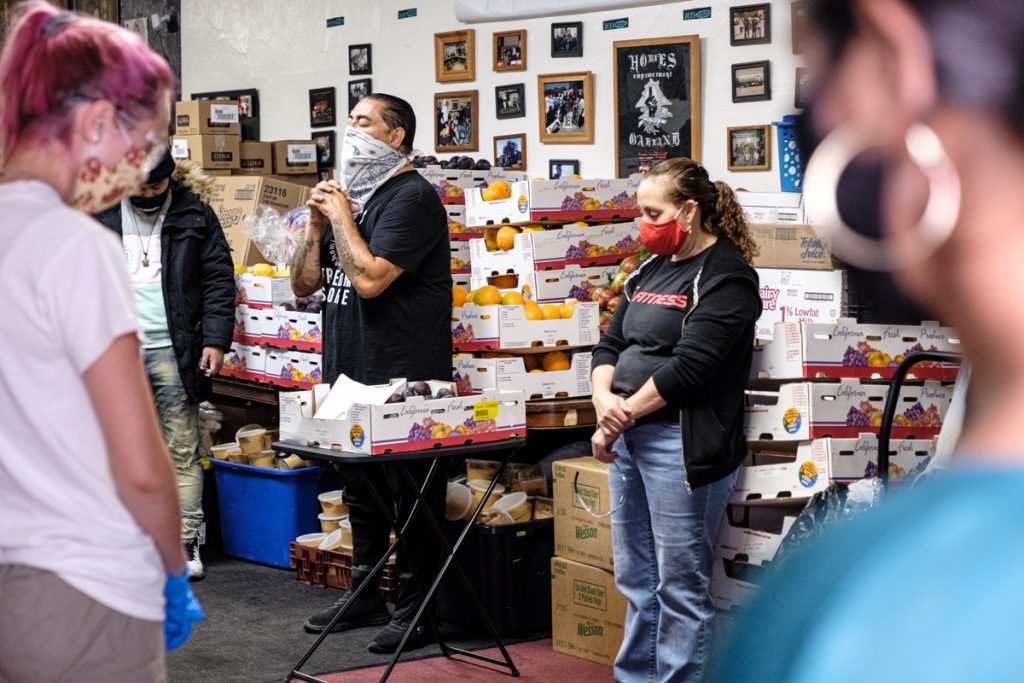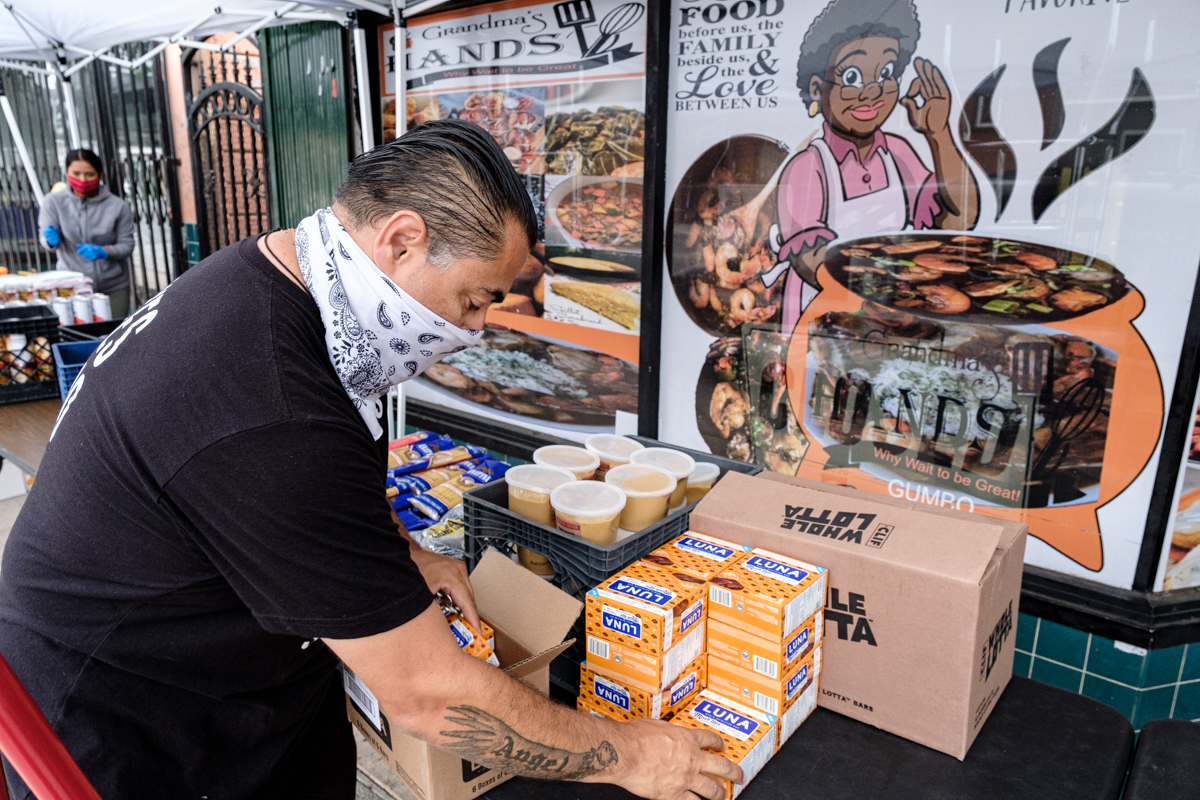It’s a cloudy morning in East Oakland’s Eastmont neighborhood, between 73rd Avenue and 76th. On a stretch of MacArthur Boulevard, among empty storefronts and next to a liquor store, a group of volunteers sets up plastic tables and canopies on the sidewalk. A sound system from a minivan emblazoned with street art loudly emits a song by the world-renowned norteño band from San Jose, Los Tigres del Norte.
“Yo soy la sangre del indio, soy Latino, soy mestizo. Somos de todos colores y de todos los oficios,” the lyrics ring out. “I am the blood of the indigenous. I am Latino. I am mestizo. We are of all colors, and of all trades.”
The volunteers, all Black and brown, wear t-shirts bearing the name of their organization: “Homies Empowerment People’s Freedom Store.” On the back is a slogan: “It Takes a Barrio.” They’re here to distribute free food and household necessities to nearby community members. Before their shift begins, each volunteer gets their temperature checked, and they all wash their hands. Everyone wears a mask, and some also wear goggles and gloves.
César Cruz is rolling a dolly loaded with food to unload on the sidewalk tables. Cruz, tall with slicked-back hair and covered in tattoos, was born in Guadalajara, the capital of the Mexican state Jalisco. He grew up in Los Angeles with his mother and grandmother. After graduating from U.C. Berkeley with a degree in history, he received his doctorate in Educational Leadership from Harvard in 2016. (He was the first Mexican-born male immigrant to do so).
Cruz co-founded Homies Empowerment in East Oakland in 2009 with Lizbeth Gomez. The group started out as a youth development organization that hosted a monthly “homies dinner” at the YMCA on 45th Avenue, where Cruz used to work. Back then, the dinner was a gathering where young kids could learn about civics and their culture, and a peace-making venue to “break bread” among gang members.
Of course, the pandemic has changed how Homies Empowerment organizes. Now, instead of hosting big events, the group is focused on what it calls its Freedom Store.
Inside their MacArthur storefront, boxes of fresh produce, pantry items, toiletries, diapers, baby formula, and other sundry goods fill the bookcases along the walls. “These used to be filled with books, Black and brown history books,” said Cruz. “Times have hit so hard that we needed to adapt. We have turned our community center into essentially a warehouse.”
Now, every Tuesday from 8 a.m. to 4 p.m., Cruz, other core members of Homies Empowerment, and over 30 volunteers gather to distribute free hot meals, fresh produce, and other essentials to the community. The Freedom Store is a makeshift “grocery store” where those who need supplies can come and grab a week’s worth of essentials.
“Some people need more diapers, some people need more formula or more frozen vegetables,” Cruz added. “We never say you can’t get more. Everybody takes what they need.”
Cruz and his team opened the Freedom Store one week after the March 17 shelter-in-place order went into effect.


Before its first week of operation, the group spent $1,000 to buy food and other essential items to distribute. On the Freedom Store’s first day, all the items were gone in under 90 minutes. Before its second week, they bought $3,000 worth of food and other pantry essentials. All were gone in less than two hours.
Other organizations, large foundations, and corporations took notice of the work that Homies Empowerment was doing and stepped up with support. World Central Kitchen, Eat.Learn.Play, the Akonadi Foundation, and the catering company Fare Resources have all gotten involved. Clif Bar & Company donated boxes of their famous snacks to be distributed as part of the Freedom Store’s weekly items.
The Freedom Store runs solely on donations and volunteer work. Some volunteers are alumni of the Homies Empowerment program, like Selena Gonzalez-Duarte, who joined the program as a middle schooler and is now the coordinator of both the organization’s headquarters and the Freedom Store. Rogelio Martinez, who began as a volunteer, has been hired to serve as inventory coordinator. Others live nearby and have personally benefited from the store.
In late March, when grocery markets, pharmacies, and big-box stores like Target were emptied of essentials like hand sanitizer, toilet paper, and some food items, people in need would line up and wait for hours to receive a bag of goods from Homies Empowerment.
Recently, one volunteer, Yolanda Castillo, helped to develop a distribution system that cut down on wait times. Those who want to get food can now come to the center as early as 6 a.m. to get a numbered ticket from Castillo, who volunteers before heading to work.
Get involved with the freedom store
Donate food and other essentials
Social Good Fund GoFundMe for cash donations
If you are in need of food or other essentials: Visit the Freedom Store, 7631 MacArthur Blvd., on Tuesdays after 6 a.m. to pick up a number. The line begins to form at 9 a.m., and the store opens at 10 a.m.

This process allows residents to avoid standing outside in line, which is especially useful to those with small children. Instead, they can line up shortly before 10 a.m. and wait for their number to be called. One of the volunteers collects their information and hands them a squeeze of hand sanitizer and a brown paper bag to pick and choose what they need. One morning this week, 96 numbers had been handed out by 8:30 a.m.
The store has compiled a list of over 2,100 “shoppers,” with roughly 400 coming by to get food every week. Most are local to Oakland, although some have come from as far as Stockton, Pittsburg, and Newark. Since its inception, the Freedom Store has served a weekly average of 400 households, 45 to 60% of whom are children under 18.
Volunteers collect personal information from Freedom Store shoppers, which gets entered into an internal database that helps Cruz and others get a sense of which items are most needed. For example, they ask how many children and how many adults are in each household. This information helps determine how much baby formula and diapers the store might need to give out in any given week.
“It allows us to shop wisely because we don’t have unlimited resources,” Cruz said.
The Freedom Store also hands out seedling plants so that people can grow their own food. Behind the storefront is a greenhouse growing everything from squash to cucumbers and watermelons. Every week, volunteers put out a few plants for people to take and grow if they have space to do so.
Homies Empowerment is also planning to work with Highland Hospital to put together “love packages” for people hospitalized and fighting COVID-19. Cruz envisions that the care packages will include self-help, poetry books, and music in the form of CDs.
“This struggle is not just a struggle with the virus,” Cruz said. “Once our mental health is affected, our mind plays tricks on us.”

By 9:30 a.m. each week, the store is fully set up, and community members are already lined up outside, ready to shop. Cruz asks volunteers to gather in a circle inside the center. Each volunteer says their name and shares the reasons why they are helping out.
“God put me here to help,” one volunteer offers.
They each go to their stations and the line of shoppers begins to pass through the outside store, gathering essentials to take back to their families.
“One of the lessons that we learned from COVID is that we cannot depend on stores,” Cruz said, referring to big chains that ran out of supplies right before and after the start of the county shelter-in-place order. “If all of a sudden we don’t have access to basic things, what does it mean to provide for ourselves? We become independent. Otherwise, we’ll wait for Amazon or Walmart to save us, and they are not going to.”

